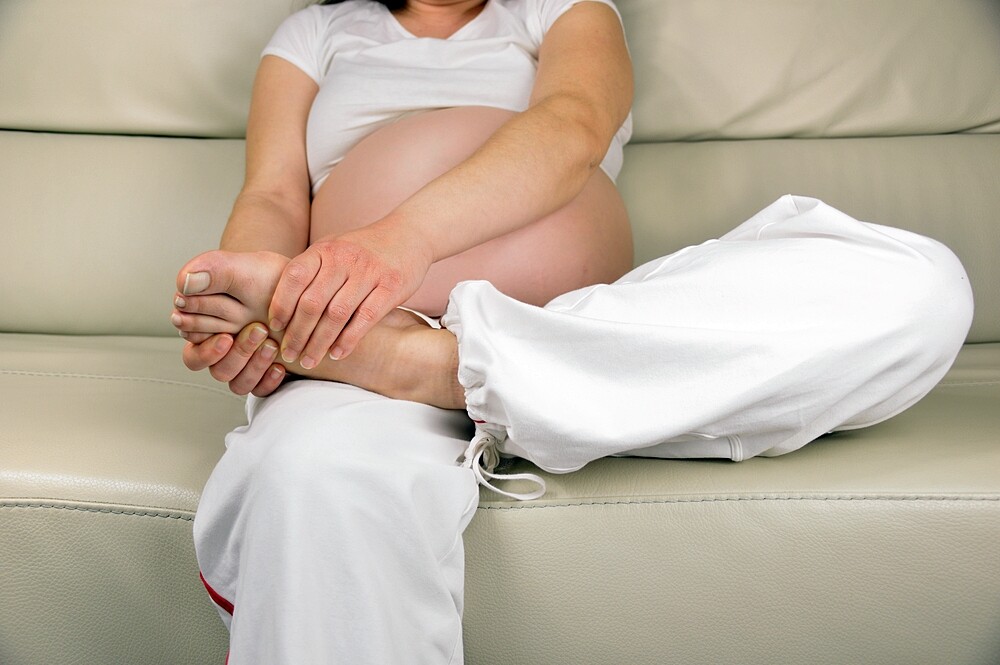Many women have to struggle with water retention during pregnancy! Here you can find out what causes this and what you can do about it.
Water retention during pregnancy occurs in two thirds of women. Especially in the last trimester, it is possible that increased water retention is noticeable: Suddenly, shoes no longer fit or rings on the fingers pinch! The reason behind this is relatively easy to explain …
Water retention during pregnancy: Causes
Water retention during pregnancy (medically known as oedema) is caused by pregnancy hormones: they cause the blood vessels to dilate and become less elastic. As a further consequence, the blood vessels become more permeable and allow water to escape, which is stored in the cell interstices of the connective tissue. Especially after long periods of sitting and standing, the fluid accumulates. Warm weather can also promote this effect. Mainly legs, feet, face and hands are affected.
In addition, during pregnancy the electrolyte levels change, which have an important function in the fluid regulation system. This can promote the development of oedema.
Are water retentions dangerous?
Water retention during pregnancy is usually harmless. Although the symptoms can become unpleasant, they gradually go away after the birth. Immediately after birth, they may increase again, but then they subside by excreting the excess water with urine or by sweating.
It becomes dangerous and possibly even life-threatening if further symptoms are added to the water retention:
- High blood pressure
- Protein excretion via the urine
- Weight gain in a short period of time (over 1 kilogram per week during the third trimester)
- Water retention in the face
- Headache
- Upper abdominal pain
- Visual disorders
- Dizziness
- Noises in the ears
In this case pre-eclampsia may be present. This is pregnancy poisoning, which can occur in three to five percent of expectant mothers. It is not necessary for all symptoms to occur at the same time and even if there is only a slight suspicion, you should consult your doctor immediately!
What can be done against water retention during pregnancy?
- Avoid long periods of sitting or standing during pregnancy.
- Exercise regularly, this will keep the blood circulation going and remove fluid.
- Avoid wearing tight shoes or constricting clothing or tight jewellery during pregnancy, as this could further impede blood flow.
- Drink enough liquid (at least 2 litres per day) to support the metabolism.
- Especially the summer with its warmth bears the danger that the blood vessels will dilate even more during pregnancy. Therefore try to avoid the heat!
- Put your legs up, works wonders for water retention during pregnancy! By putting your legs up for 20 to 30 minutes, the fluid in your legs can drain better. It is also recommended that the legs are placed slightly higher than the pelvis during the night.
- Put on support stockings after getting up. They prevent the blood from collecting in the legs.
- Treat yourself to foot baths with salt water from time to time, they reduce water retention. Alternate showers of the swollen areas are also useful to stimulate the blood circulation. You should finish off with cold water.
- Perform regular light massages on the legs: Stroking your legs with gentle pressure towards the heart stimulates blood flow.
Caution: In the past, pregnant women who suffer from water retention should not eat salty food. Various dehydration cures were suggested for this purpose. This advice should never be followed! Salt is very important for a functioning metabolism and should therefore not be avoided. We also advise against special diets, dehydrating tablets or household remedies. A healthy and balanced diet is very important during pregnancy!

